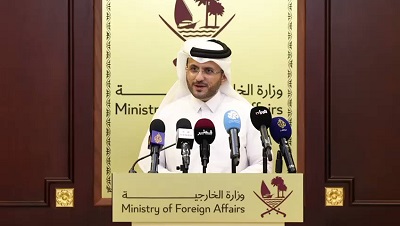Abu Dhabi, (Asian independent) Qatar, the chief negotiator in the Israel-Hamas war, has said it is getting replies from both Israel and the Hamas as it engages in serious discussions with them to find a new solution to end the war that includes a two-state formula.
The war has so far killed over 20,000 Palestinians and 2,000 Israeli soldiers in a span of over 100 days.
Qatar said it’s engaged in “serious discussions” with Israel and Hamas and is receiving “constant replies” from both sides. But statements made by Israeli officials “lead to a harder mediation process”, Qatar’s Foreign Ministry spokesperson, Majed Al-Ansari, said in a news conference on Tuesday.
“Obviously, when one side says they don’t accept the two state-solution and that they won’t stop this war eventually… it leads to a harder mediation process,” Al-Ansari pointed out.
Israeli Prime Minister Benjamin Netanyahu has rejected global calls, including from the US, for Palestinian sovereignty following talks with US President Joe Biden about Gaza’s future, suggesting Israel’s security needs would be incompatible with Palestinian statehood.
Communication breakdown and the worsening humanitarian situation in Gaza has impacted the talks from yielding results, media reports said.
But mediation is in full swing with Qatar exchanging ideas between both sides, Al-Ansari said.
“Our negotiators are working around the clock to exchange these ideas, a lot of these media reports are either missing elements or completely false,” he said in response to news reports that Israel offered a two-month ceasefire to Hamas as part of a prospective hostage deal.
Meanwhile, the situation around the Khan Younis hospitals is deteriorating amid intense shelling, the United Nations said.
The UN says that the situation at hospitals in the Khan Younis area of southern Gaza has deteriorated as Israeli military operations in the area have expanded, CNN reported from Gaza.
“Reportedly, Israeli forces struck the vicinity of Al-Amal hospital and the ambulance headquarters, as intense fighting continued in the area, including dozens of casualties,” the Office for the Coordination of Humanitarian Affairs (OCHA) said on Tuesday, adding that it estimated that “13,000 displaced people who have taken shelter in Al Amal Hospital and the PRCS [Palestinian Red Crescent Society] headquarters were unable to leave”.
OCHA cited humanitarian partners as saying that people in the vicinity and in the Al Kheir area east of Al Mawasi had lost access to the health facility, reports said.
The Israel Defense Forces (IDF) claimed that it had surrounded Khan Younis and instructed civilians to leave several districts and move towards the coast, which it described was “safer”.
Roads leading to Al-Amal hospital were closed due to ongoing shooting by IDF in Khan Younis, the PRCS said on Tuesday. Separately, the UN relief agency in Gaza said that one of its shelters in the Khan Younis area had been hit.
At least six displaced people were killed and many more injured during intense fighting around the shelter. Terrified staff, patients and displaced people are now trapped inside the few remaining hospitals in Khan Younis as heavy fighting continues,” the agency’s director, Phillipe Lazzarini, said on X.
Meanwhile, the UK and the US are set to announce new sanctions on Houthis after more strikes in Yemen.
The two countries will announce the new sanctions on Houthis “in the coming days”, UK Prime Minister Rishi Sunak said on Tuesday.
“We’re going to use the most effective means at our disposal to cut off the Houthis’ financial resources, where they are used to fund these attacks [on commercial ships in the Red Sea],” Sunak told the House of Commons.
“We are working closely with the United States on this and plan to announce new sanctions measures in the coming days,” he said.
The news comes atop another US and UK airstrike on Houthi targets in Yemen, which Sunak said were “limited to carefully selected targets, with maximum caretaking to protect civilian lives”.
He also stressed that the strikes were “fully in line with international law, in self-defence, and in response to a persistent threat”.
Sunak said the sanctions are part of a wider UK response to the Houthi attacks on commercial vessels in the Red Sea. The UK will continue to deliver humanitarian aid to Yemen and help negotiate peace in the country, Sunak said on Tuesday.
“We’re going to use the most effective means at our disposal to cut off the Houthis’ financial resources, where they are used to fund these attacks [on commercial ships in the Red Sea],” Sunak told the House of Commons.








